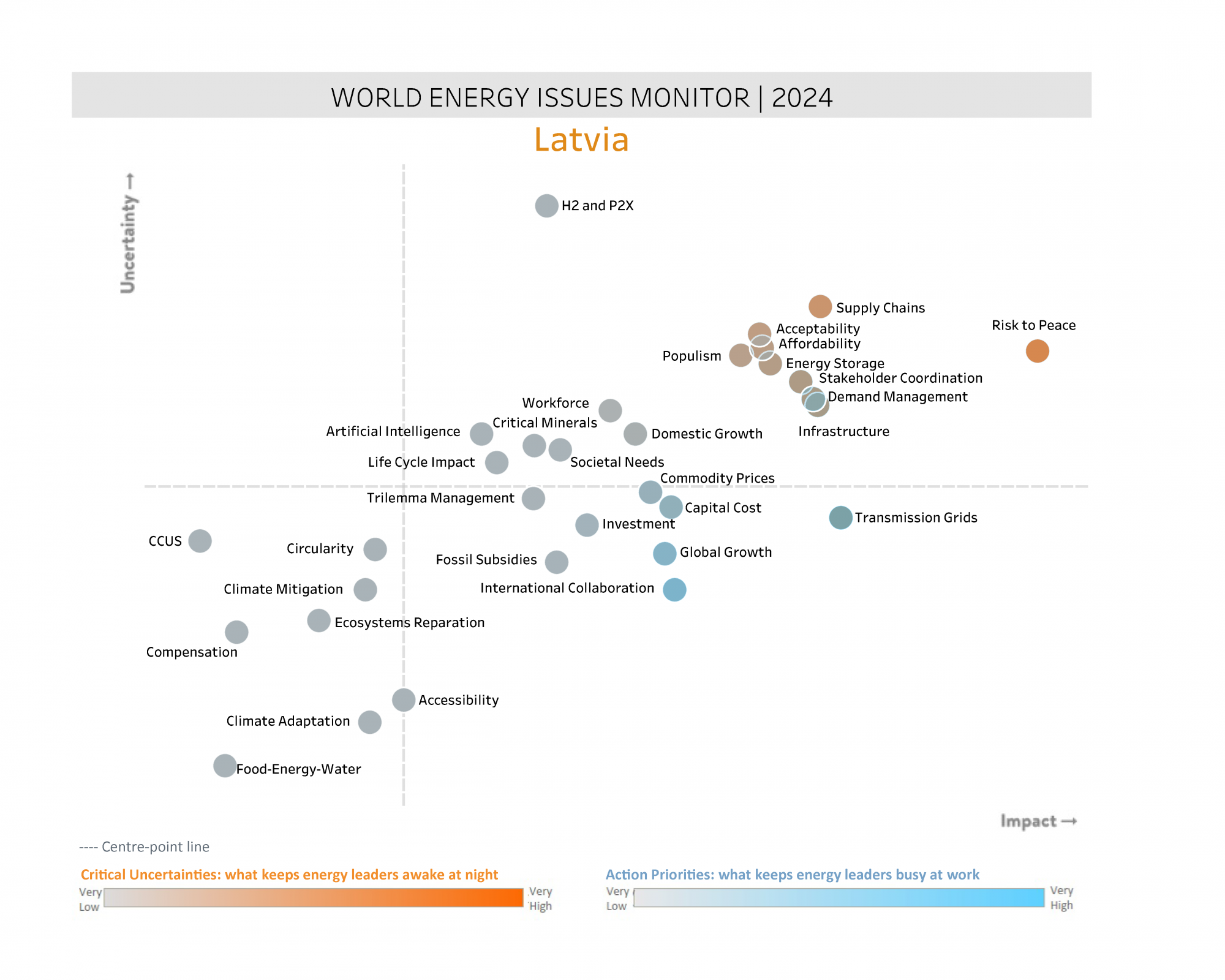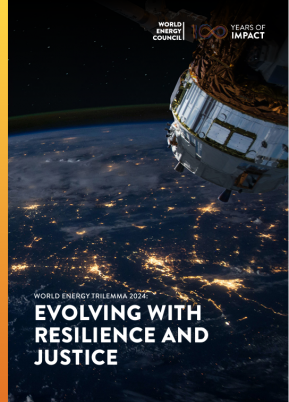The main tasks of the Latvian Member Committee are to cooperate with the World Energy Council and the other National Committees, as well as other national and international energy organizations; encourage domestic energy exploration, extraction, recycling and efficient use; promote the transportation of imported energy resources, conversion and use in all respects; address energy supply problems taking into account social and environmental aspects; act as an information coordinator to work with other energetic problem solving organizations; participate in congresses, assemblies, conferences, forums, and other events and to organize them; and disseminate information on its activities.

Dr. Olga Bogdanova, President of the Latvian National Committee of the World Energy Council, Associate Professor of the University of Latvia, Faculty of Business Management and Economy, Director of Tax Administration and Society Interests Policy Department at the Ministry of Finance of the Republic of Latvia, Deputy Chair of the Supervisory Board at power transmission system operator JSC Augstsprieguma tikls having a controlling stock of gas transmission and gas storage system operator JSC Conexus Baltic Grid, Member of the Studies Committee and expert at World Energy Council, FEL-100 program alumni, Chair of the Future Energy Leaders Latvia (FEL Latvia) program. Author of more than 35 scientific papers and co-author of 4 monographs. She has a Doctor of Economics degree (2012) and is an expert of the Latvian Scientific Council in the field “Economics” (since 2017).
Energy in Latvia

After the rapid recovery of the economy from the Covid-19 pandemic crisis in 2021, growth in Latvia slowed down to 3% in 2022. The economic development in 2022 was significantly affected by supply chain disruptions caused by Russia's invasion of Ukraine, the rise in inflation caused by the cost of energy resources and food, as well as the decrease in global demand. In 2023, economic development continued to be affected by the geopolitical situation and uncertainty, high prices and rising bank interest rates. GDP decreased by 0.3%. In general, private consumption, export and import decreased in 2023, albeit public consumption and investments increased. However, thanks to the increase in funding from EU funds, in 2023, investments in the gross fixed capital formation were 8.2% higher than a year ago. (Macroeconomic review of Latvia, 2024)
According to Latvian TSO AS “Augstspreiguma tīkls” data, in 2023, the average electricity price in Latvia decreased by 59% compared to 2022, to 93,89 EUR per megawatt hour (EUR/MWh), and the amount of electricity produced from renewable energy sources increased significantly to 77,6%, reaching the highest share of renewable energy in at least the last 13 years. Latvia covered 88,3% of its consumption with local generation, which is the highest rate since 2017. After the volatile and unprecedented 2022, last year saw a stabilisation and a decline in prices both in Latvia and in Europe: already in January, the average monthly price in Latvia slipped below the 100 EUR/MWh mark for the first time since August 2021; The decrease in electricity prices was mainly driven by lower prices for gas and other fossil resources, which reached a record high in 2022, as well as higher development of wind and solar power plants. In 2023, 6 083 gigawatt hours (GWh) of electricity were produced in Latvia, 26,2% more than a year earlier, while the amount of electricity consumption decreased by 3,4% to 6 887 GWh per year; Overall, Latvia's capacity to cover its consumption with domestic generation in 2023 is stable and has the potential to grow. Dependence on fossil resources has decreased - 77,6% of the electricity produced was generated from renewable energy sources, including the highest recorded share of green electricity in May, when 99,9% of the electricity produced in Latvia was generated from renewable energy sources. (ELECTRICITY MARKET OVERVIEW 2024, AST) The important project to be implemented in February 2025 is the synchronisation of Baltic power system with European continental network (ECN). Latvian TSO together with other regional TSOs is implementing preparatory projects for synchronisation. It includes also market arrangement and qualification procedures for trading of ancillary services.
The most common renewable energy sources in Latvia are biomass and hydropower. There is a considerable potential to further develop wind power and solar energy, and this sector is growing considerably in the region. To boost economic growth and mitigate the effects of the Covid-19 crisis, entrepreneurs also have access to several support programmes, contributing to economic transformation, productivity and digitisation, housing affordability, reducing inequalities, including rental and social housing, as well as energy efficiency. Green transition is one of the key priorities the in EU Structural Funds support programmes and the Recovery and Resilience Facility Plan funding.
Taking into account the proposal to include nuclear and natural gas into the EU taxonomy, the interest in implementation of measures to enhance the efficiency of natural gas cogeneration power plants and projects, such as SMR (small modular reactors) increased in the region. Another reflection is an interest in diversifying the use of gas grid by allowing alternative gases, such as biomethane and hydrogen, as well as using molecules for decarbonization of industry and transport. The CO2 capture, use and storage (CCUS) research project is also in focus on Latvian entrepreneurs. This is also driven by European directives, for example about the use of SAF (synthetic aviation fuel).
_____________________________________________________________________________
The 2024 World Energy Issues Survey highlighted risk to peace, supply chains, infrastructure, demand management and stakeholder coordination as Critical Uncertainties in Latvia.
Risk to peace. The high uncertainty level marked to the risk to peace is related to the ongoing war in Ukraine. It is not clear for how long the hostilities could continue. Due to the geographical location of Latvia, its neighbourhood to Russia and Belarus, general geopolitical situation and the support provided by Latvia to Ukraine the war affects economic processes and overall situation in Latvia.
Supply chains. Since the beginning of 2022 and Russia's invasion of Ukraine the Latvian entrepreneurs have had to significantly revise their business supply chains. Economic cooperation with Russia was significantly reduced, including the implementation of sanctions restrictions applied to the transactions with the sanctioned Russia’s persons. The uncertainties could be related to the fact that the market is still adjusting to the new conditions.
Infrastructure. Latvia experiences a very high market interest and activity related to the renewable energy projects being prioritized thanks to their contribution to import dependency elimination and sustainable transition. At the same time, the overall capacity of the draft RES project initiatives currently exceeds the available connection capacities creating uncertainties regarding the necessity for further development of network. In addition to that, there are still discussions ongoing on the possible future cross border interconnection projects.
Demand management. Along with a rapid development of RES, the issue of ensuring the flexibility of the electricity market and meeting demand when variable generation from wind and solar energy is not available in sufficient quantities remains more and more relevant. To ensure additional flexibility of the energy system, swift development of the electricity market is taking place in the Baltic States, both by switching to a shorter electricity trading period and organizing more frequent auctions, and by launching the Baltic balancing reserve capacity market.
Coordination of stakeholders. In Latvia, active work is underway on the National Climate and Energy Plan, and the need to shape a long-term energy sector strategy that would facilitate mutual coordination of the parties involved is being discussed. At the moment, it is not clear how this coordination of the parties could be organized in the most efficient way.
The main Action Priorities for Latvia are transmission grids, international collaboration, global growth, infrastructure and demand management.
Transmission grids. The issue has been highlighted as a high-priority course of action mainly due to the implementation of the ongoing Baltic states’ power system synchronization project with the continental European network planned for February 2025, as well as the rapid development of RES.
International collaboration. This action priority is to a large extent related to the implementation of the synchronization project of the Baltic States’ power system, as well as close cooperation between (primarily) the Baltic States in energy projects, considering close neighbourhood and interconnections.
World growth. As a small open economy, Latvia reacts very significantly to external signals. The growth of the world economy will contribute to the growth of Latvia as well.
Infrastructure. Infrastructure development has been highlighted as an essential priority both for the wider integration of RES into the network and for synchronization with the European networks.
Demand management. Experts recognize that ensuring the flexibility of the electricity market and the effective functioning of the balancing market are essential both for preventing high electricity prices during peak demand hours and for reducing CO2. It is important to provide a favourable regulatory framework for the further development of demand management.
Acknowledgements
Latvia Member Committee
Downloads

Latvia World Energy Trilemma Country Profile 2024
Download PDF
Latvia Energy Issues Monitor 2024
Download PDF
World Energy Issues Monitor 2024
Download PDF










